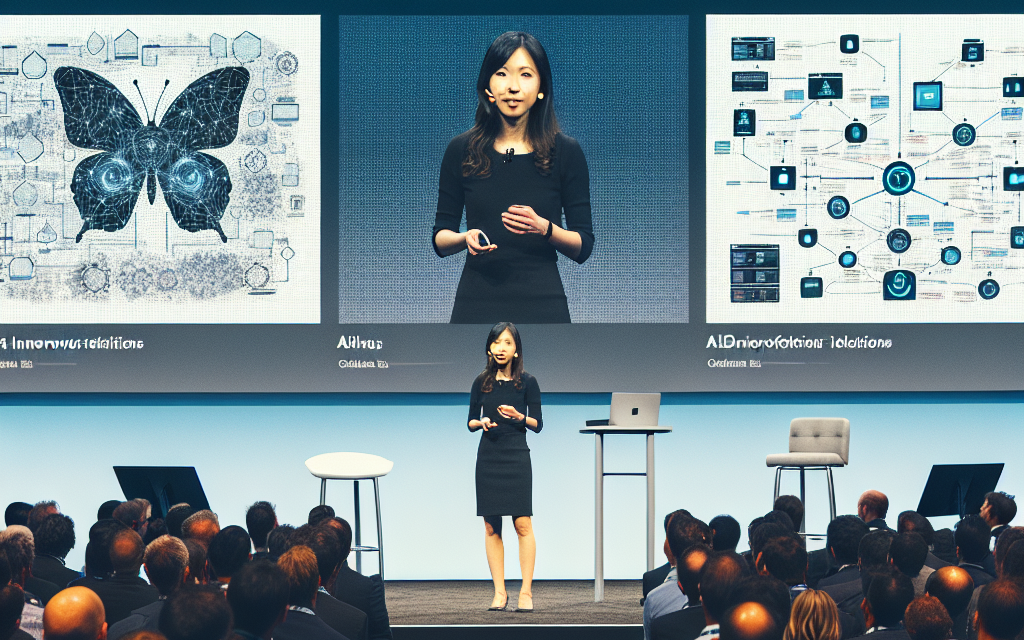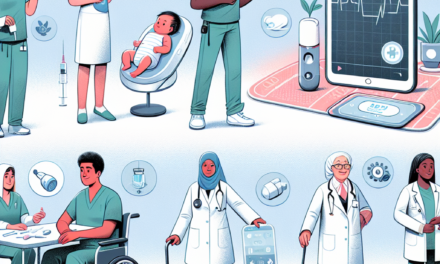Kaiser Permanente’s AI Leader Discusses Two Key Transformations Enabled by Technology
Kaiser Permanente, one of the largest not-for-profit health plans in the United States, has been at the forefront of integrating technology into healthcare. With a commitment to improving patient outcomes and operational efficiency, the organization has embraced artificial intelligence (AI) as a transformative tool. In this article, we will explore two key transformations enabled by technology as discussed by Kaiser Permanente’s AI leader. We will delve into the realms of predictive analytics and personalized medicine, examining how these innovations are reshaping healthcare delivery.
1. Predictive Analytics: Anticipating Patient Needs
Predictive analytics is a powerful tool that leverages historical data, statistical algorithms, and machine learning techniques to identify the likelihood of future outcomes. In healthcare, this means anticipating patient needs before they arise, which can lead to improved care and reduced costs.
Understanding Predictive Analytics in Healthcare
At its core, predictive analytics involves analyzing vast amounts of data to uncover patterns and trends. In the context of healthcare, this data can come from various sources, including electronic health records (EHRs), patient surveys, and even social determinants of health. By utilizing AI algorithms, healthcare providers can predict which patients are at risk for certain conditions, enabling proactive interventions.
Case Study: Reducing Hospital Readmissions
Kaiser Permanente has implemented predictive analytics to address the issue of hospital readmissions, which is a significant concern in healthcare. By analyzing data from previous admissions, the organization developed models that identify patients at high risk of readmission within 30 days of discharge. These models take into account factors such as age, comorbidities, and social support systems.
As a result, Kaiser Permanente has been able to implement targeted interventions for at-risk patients. For instance, care coordinators reach out to these individuals post-discharge to ensure they understand their medication regimens and have access to follow-up care. This proactive approach has led to a notable decrease in readmission rates, ultimately improving patient outcomes and reducing costs for the organization.
Enhancing Chronic Disease Management
Another area where predictive analytics has made a significant impact is in the management of chronic diseases. Conditions such as diabetes, heart disease, and asthma require ongoing monitoring and management. By utilizing predictive models, Kaiser Permanente can identify patients who may be struggling with their conditions and intervene before complications arise.
- Data-Driven Interventions: For example, patients with diabetes can be monitored through regular blood sugar readings. Predictive analytics can identify trends that indicate a patient is at risk of developing complications, prompting timely interventions.
- Personalized Care Plans: By understanding individual patient needs, healthcare providers can create personalized care plans that address specific risk factors, leading to better management of chronic conditions.
Challenges and Ethical Considerations
While the benefits of predictive analytics are clear, there are also challenges and ethical considerations that must be addressed. Data privacy is a significant concern, as healthcare organizations must ensure that patient information is protected. Additionally, there is the risk of bias in AI algorithms, which can lead to disparities in care if not properly managed.
Kaiser Permanente is committed to addressing these challenges by implementing robust data governance frameworks and continuously monitoring the performance of their predictive models. By doing so, they aim to ensure that the benefits of predictive analytics are realized equitably across all patient populations.
2. Personalized Medicine: Tailoring Treatments to Individual Patients
Personalized medicine, also known as precision medicine, is an approach that tailors medical treatment to the individual characteristics of each patient. This transformation is made possible through advancements in genomics, data analytics, and AI, allowing healthcare providers to deliver more effective and targeted therapies.
The Role of Genomics in Personalized Medicine
Genomics plays a crucial role in personalized medicine by providing insights into an individual’s genetic makeup. By analyzing a patient’s genome, healthcare providers can identify genetic variations that may influence their response to certain medications or their risk for specific diseases.
Kaiser Permanente has been at the forefront of integrating genomic data into clinical practice. For instance, the organization has established a comprehensive genomic testing program that allows patients to undergo genetic testing for various conditions. The results of these tests can inform treatment decisions, leading to more effective and tailored therapies.
Case Study: Oncology and Targeted Therapies
One of the most significant applications of personalized medicine is in the field of oncology. Traditional cancer treatments often take a one-size-fits-all approach, which may not be effective for all patients. However, with the advent of targeted therapies, healthcare providers can now tailor treatments based on the specific genetic mutations present in a patient’s tumor.
Kaiser Permanente has implemented a program that utilizes genomic testing to identify patients who may benefit from targeted therapies. For example, patients with breast cancer may undergo testing for mutations in the HER2 gene. If a mutation is identified, the patient may be eligible for targeted therapies that specifically target HER2-positive tumors, leading to improved outcomes.
Improving Patient Engagement and Adherence
Personalized medicine also extends beyond treatment selection; it encompasses patient engagement and adherence to treatment plans. By providing patients with information about their genetic predispositions and treatment options, healthcare providers can empower individuals to take an active role in their healthcare.
- Education and Support: Kaiser Permanente offers educational resources to help patients understand their genetic test results and the implications for their treatment. This education fosters a sense of ownership and responsibility for their health.
- Tailored Communication: Personalized communication strategies can also enhance patient adherence. For instance, patients with chronic conditions may receive reminders tailored to their specific treatment regimens, improving adherence rates.
Ethical Considerations in Personalized Medicine
As with predictive analytics, personalized medicine raises ethical considerations that must be addressed. Issues such as genetic privacy, informed consent, and potential discrimination based on genetic information are critical concerns. Kaiser Permanente is committed to ensuring that patients are fully informed about the implications of genetic testing and that their data is handled with the utmost care.
By establishing clear policies and guidelines, Kaiser Permanente aims to navigate the ethical landscape of personalized medicine while maximizing its benefits for patients.
3. The Integration of AI in Clinical Decision-Making
The integration of AI into clinical decision-making processes is another transformative aspect of technology in healthcare. AI algorithms can analyze vast amounts of data to assist healthcare providers in making informed decisions about patient care.
Enhancing Diagnostic Accuracy
One of the most promising applications of AI in healthcare is its ability to enhance diagnostic accuracy. Traditional diagnostic methods can be time-consuming and prone to human error. However, AI algorithms can analyze medical images, lab results, and patient histories to provide more accurate diagnoses.
Kaiser Permanente has implemented AI-driven diagnostic tools that assist radiologists in interpreting medical images. For example, AI algorithms can analyze X-rays and MRIs to identify abnormalities that may be indicative of conditions such as cancer or fractures. By providing radiologists with additional insights, these tools can improve diagnostic accuracy and reduce the likelihood of missed diagnoses.
Supporting Clinical Decision-Making
In addition to enhancing diagnostic accuracy, AI can support clinical decision-making by providing evidence-based recommendations. By analyzing patient data and comparing it to vast medical literature, AI algorithms can suggest treatment options that are most likely to be effective for individual patients.
- Clinical Pathways: Kaiser Permanente has developed clinical pathways that incorporate AI-driven recommendations. These pathways guide healthcare providers in selecting appropriate treatments based on the latest evidence and patient characteristics.
- Real-Time Decision Support: AI can also provide real-time decision support during patient encounters. For instance, when a provider is considering a treatment option, an AI tool can quickly analyze the patient’s data and suggest alternatives based on similar cases.
Improving Patient Safety
Patient safety is a paramount concern in healthcare, and AI can play a crucial role in minimizing errors. By analyzing data from various sources, AI algorithms can identify potential safety risks and alert healthcare providers before they escalate.
Kaiser Permanente has implemented AI-driven safety monitoring systems that track medication prescriptions and patient outcomes. For example, if a patient is prescribed a medication that may interact negatively with another drug they are taking, the system can alert the provider, preventing potential adverse events.
Challenges in AI Integration
Despite the potential benefits of AI in clinical decision-making, there are challenges to its integration. Issues such as data interoperability, algorithm transparency, and provider training must be addressed to ensure successful implementation.
Kaiser Permanente is actively working to overcome these challenges by investing in training programs for healthcare providers and establishing partnerships with technology companies to develop interoperable systems. By fostering collaboration and innovation, they aim to create a seamless integration of AI into clinical workflows.
4. The Impact of AI on Operational Efficiency
In addition to enhancing patient care, AI has the potential to significantly improve operational efficiency within healthcare organizations. By automating routine tasks and optimizing workflows, AI can free up valuable time for healthcare providers and administrative staff.
Streamlining Administrative Processes
Administrative tasks such as scheduling appointments, managing billing, and processing insurance claims can be time-consuming and prone to errors. AI can automate many of these processes, reducing the administrative burden on healthcare organizations.
Kaiser Permanente has implemented AI-driven scheduling systems that optimize appointment bookings based on patient preferences and provider availability. This not only improves patient satisfaction but also maximizes the utilization of healthcare resources.
Enhancing Resource Allocation
AI can also play a crucial role in resource allocation within healthcare organizations. By analyzing patient data and demand patterns, AI algorithms can help organizations predict patient volumes and allocate resources accordingly.
- Staffing Optimization: For example, Kaiser Permanente can use AI to forecast patient visits and adjust staffing levels in real-time, ensuring that there are enough providers available to meet patient needs.
- Supply Chain Management: AI can also optimize supply chain management by predicting the demand for medical supplies and ensuring that they are available when needed, reducing waste and costs.
Improving Financial Performance
Operational efficiency directly impacts the financial performance of healthcare organizations. By reducing administrative costs and optimizing resource allocation, AI can contribute to improved financial outcomes.
Kaiser Permanente has reported significant cost savings as a result of their AI initiatives. By streamlining processes and improving efficiency, the organization has been able to allocate resources more effectively and invest in patient care initiatives.
Challenges in Achieving Operational Efficiency
While the potential for improved operational efficiency through AI is significant, there are challenges to overcome. Resistance to change, data integration issues, and the need for ongoing training are all factors that can hinder successful implementation.
Kaiser Permanente is addressing these challenges by fostering a culture of innovation and collaboration. By engaging staff in the development and implementation of AI solutions, they aim to create a sense of ownership and commitment to the changes being made.
5. The Future of AI in Healthcare: Opportunities and Challenges
The future of AI in healthcare holds immense promise, but it also presents challenges that must be navigated carefully. As technology continues to evolve, healthcare organizations like Kaiser Permanente are at the forefront of exploring new opportunities for innovation.
Emerging Technologies and Trends
As AI technology advances, new applications are emerging that have the potential to further transform healthcare. For instance, natural language processing (NLP) is being used to analyze unstructured data from clinical notes, enabling healthcare providers to gain insights from patient interactions.
Additionally, advancements in telemedicine and remote monitoring are creating new opportunities for AI integration. By analyzing data from wearable devices and telehealth consultations, AI can provide real-time insights into patient health and facilitate timely interventions.
Addressing Ethical and Regulatory Challenges
As AI becomes more integrated into healthcare, ethical and regulatory challenges will need to be addressed. Issues such as data privacy, algorithm bias, and accountability for AI-driven decisions are critical concerns that must be navigated carefully.
Kaiser Permanente is committed to ensuring that ethical considerations are at the forefront of their AI initiatives. By establishing clear guidelines and engaging stakeholders in discussions about the implications of AI, they aim to foster a responsible approach to technology adoption.
Collaboration and Partnerships
The future of AI in healthcare will also rely on collaboration and partnerships between healthcare organizations, technology companies, and regulatory bodies. By working together, stakeholders can develop innovative solutions that address the complex challenges facing the industry.
- Public-Private Partnerships: Kaiser Permanente has engaged in partnerships with technology companies to develop AI solutions that enhance patient care and operational efficiency.
- Research Collaborations: Collaborating with academic institutions can also drive innovation by leveraging research expertise and resources.
Preparing the Workforce for the Future
As AI continues to evolve, healthcare organizations must prepare their workforce for the future. This includes providing training and education on AI technologies, as well as fostering a culture of continuous learning and adaptation.
Kaiser Permanente is investing in workforce development initiatives to ensure that their staff is equipped with the skills needed to leverage AI effectively. By fostering a culture of innovation and collaboration, they aim to create an environment where employees feel empowered to embrace new technologies.
Conclusion: Embracing the Future of Healthcare with AI
Kaiser Permanente’s commitment to leveraging AI for transformative change in healthcare is evident in their initiatives surrounding predictive analytics and personalized medicine. By anticipating patient needs and tailoring treatments to individual characteristics, the organization is improving patient outcomes and operational efficiency.
As we look to the future, the opportunities for AI in healthcare are vast, but they come with challenges that must be navigated carefully. By addressing ethical considerations, fostering collaboration, and preparing the workforce for the future, healthcare organizations can harness the power of AI to create a more effective and equitable healthcare system.
In summary, Kaiser Permanente’s journey into the realm of AI serves as a model for other healthcare organizations seeking to embrace technology for transformative change. The integration of predictive analytics and personalized medicine not only enhances patient care but also paves the way for a more efficient and innovative healthcare landscape.





